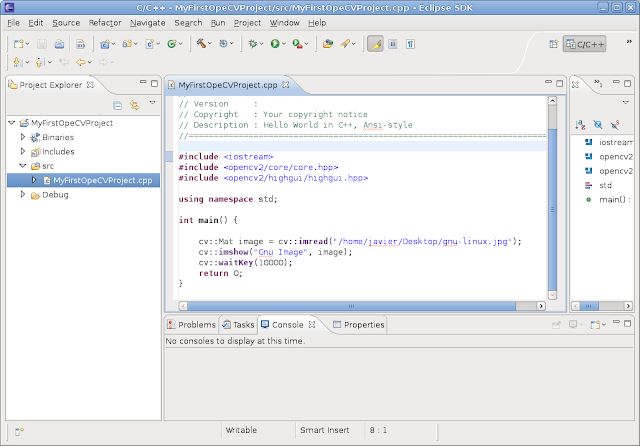If you followed my previous post http://linuxtortures.blogspot.com/2012/02/shared-libraries-with-eclipse.html
where I explained how to develop shared shared libraries there are a couple of extra steps that you must follow if you want to do the same onto a 84_64 system.
A. Download the appropriated version of eclipse from the official download page.
The package deployed for debian amd64 (Eclipse-CDT) does not work very well, so in this case the trick of adding the backports repository will not be useful.
B. Eclipse is java-based so you can just untar the file and execute the 'eclipse' file inside:
If you find difficulties when executing eclipse, or eclipse environment generates errors most probably there are dependencies that are not fulfilled. A non very elegant solution could be install the eclipse-cdt from the backports (It will automatically install all the needed dependencies) and then uninstall it. Then you can should be able to execute your 'manually' downloaded eclipse without issues.
C. Making and compiling Shared libraries:
Here there is a slight difference regarding the previous post. If you want to make a shared library compile within a 64 bits system you will need the 'Position Independent Code' (basically it will add the options '-fPIC' to g++, otherwise you will receive a nice error like the following:
/usr/bin/ld: ./MyClass.o: relocation R_X86_64_32S against `vtable for MyClass' can not be used when making a shared object; recompile with -fPIC
Fortunately Eclipse allows us to make this in a graphical way (Right click on the shared library --> Properties) and check the following check-box:
That should make the work. If you are very interested on this option you can find more information here:
http://www.technovelty.org/code/c/amd64-pic.html
where I explained how to develop shared shared libraries there are a couple of extra steps that you must follow if you want to do the same onto a 84_64 system.
A. Download the appropriated version of eclipse from the official download page.
The package deployed for debian amd64 (Eclipse-CDT) does not work very well, so in this case the trick of adding the backports repository will not be useful.
B. Eclipse is java-based so you can just untar the file and execute the 'eclipse' file inside:
If you find difficulties when executing eclipse, or eclipse environment generates errors most probably there are dependencies that are not fulfilled. A non very elegant solution could be install the eclipse-cdt from the backports (It will automatically install all the needed dependencies) and then uninstall it. Then you can should be able to execute your 'manually' downloaded eclipse without issues.
C. Making and compiling Shared libraries:
Here there is a slight difference regarding the previous post. If you want to make a shared library compile within a 64 bits system you will need the 'Position Independent Code' (basically it will add the options '-fPIC' to g++, otherwise you will receive a nice error like the following:
/usr/bin/ld: ./MyClass.o: relocation R_X86_64_32S against `vtable for MyClass' can not be used when making a shared object; recompile with -fPIC
Fortunately Eclipse allows us to make this in a graphical way (Right click on the shared library --> Properties) and check the following check-box:
That should make the work. If you are very interested on this option you can find more information here:
http://www.technovelty.org/code/c/amd64-pic.html





















